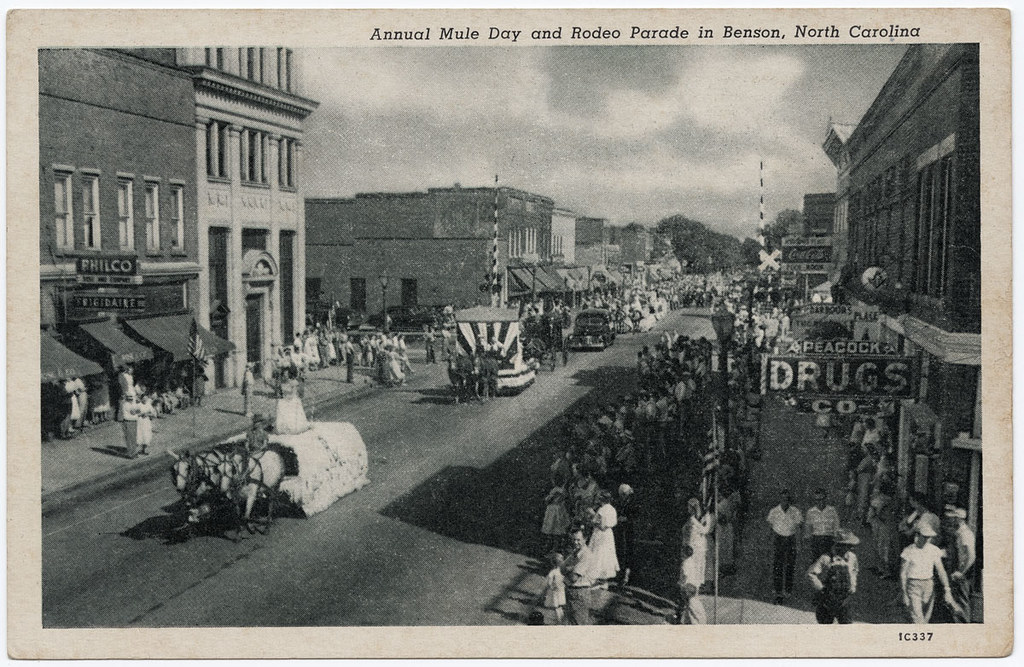On Wednesday evening, January 14, 1942, David “Herman” Allen, his wife, Ruth Lee Massengill Allen, Leon Allen, and Lettie Ballinger were having a night out in Benson, N.C., a small town about 35 miles south of Raleigh. After visiting a number of places, they drove to Bill Benson’s filling station, arriving there at about 1:00 a.m.
The station was closed. Herman Allen got out of the car to go wake up the owner. He wanted some cigarettes and cold drinks. He had been drinking rather heavily and was abusive and quarreling with his wife. While he was gone, the others decided it would be best for them to leave him there and drove off. Unknowingly, they had set in motion a chain of events that would lead to four deaths.
Leon and Lettie dropped Ruth off at her mother’s house around 2:30 a.m. Both Herman and Ruth had been staying with their respective mothers to help out, but the couple was not estranged.
In the meantime, Allen walked from the filling station to his mother’s home, a distance of seven miles. He tried to borrow his brother’s car, but his brother refused to let him have it. Instead, Herman took his brother’s 16 gauge shotgun and nearly a box of shells.
Around 3:00 a.m., he arrived at William “Cap” Raynor’s house 500 yards away. Allen called for him to come outside, and when he did, Allen shot him, reloaded the shotgun, and shot him again. Leaving Raynor lying dead on the front porch, Allen walked seven miles to the home of his mother-in-law, Mrs. Claudia Lee.
Melee of Murder
Allen arrived at the Lee house at about 6:00 a.m. It was still dark outside. Inside were Mrs. Lee, Grady Lee, her son, Ruth Allen, and 10-year-old Rufus Massengill, Ruth’s son from her first marriage. Allen knocked loudly and demanded to be let in.
Grady, who was sitting in the kitchen eating breakfast, called out and asked what he wanted. Allen moved around to the kitchen window and shot through it, hitting Grady in the head. He died 30 hours later in Johnston County Hospital.
Rufus went to open the door. Mrs. Lee fled, heading to the home of her son, Carl, to get help. Allen entered the house, dragged his wife out of bed, and around her brother lying on the kitchen floor, which was covered in blood. A scuffle ensued, and she got away and ran toward the smokehouse.
At some point, Allen fired at Rufus and missed. The boy took shelter under the house. Allen caught up with Ruth, dragged her into the barn, and shot her in the back of the head. Rufus found her body after Allen left in Grady’s car.
Allen returned to his mother’s house, put some clothes in a suitcase, and decided to head to Elizabeth City. He stopped at Guthrie Barefoot’s house to get a tire repaired and was arrested there. The loaded shotgun and 10 extra shells were found in the car.
The state elected to try Allen specifically for the murder of Grady Lee. At his trial, which began on February 11, Herman Allen’s lawyers pleaded temporary insanity. Allen claimed that his wife had admitted to him that evening that she was having a sexual relationship with Cap Raynor, who was a friend to both of them. The defense also argued for leniency because Allen was drunk when he committed the murders. He claimed to have no memory of the killings. He would stick to this story until his death.
After deliberating for an hour and 45 minutes, the jury found Herman Allen guilty of murder in the first degree. Judge Jeff Johnson sentenced him to die in the gas chamber at Central Prison in Raleigh. Throughout the trial, the courtroom was jammed with spectators. All the auditorium and balcony seats were occupied, and people stood in the aisles and filled the back of the court.
On February 30, David Herman Allen was executed in Central Prison’s gas chamber at 10:00 a.m. His death took 10 minutes and 20 seconds. The death certificate listed the cause of death as legal execution: asphyxiation by the State of North Carolina.

A History of Violence
It’s impossible to say exactly what would have happened if Allen hadn’t been left at the filling station. It’s entirely possible that the night might have ended in murder regardless, or he may have snapped at a later date, with the only difference being the number and names of his victims. That night in January wasn’t the first time he had killed.
On August 5, 1930, Allen shot and killed a man named Handy Minson Hodges, who was a boarder in his home with a double-barrelled shotgun. He claimed to have woken in the night, found his wife missing, and went to look for her. He said he passed by Hodges’ window and saw him and his wife in a compromising position.
Allen brooded over the matter until morning, then left the house and borrowed a double-barrelled shotgun from a neighbor. After returning home, he talked to Hodges for about five minutes before shooting him.
He chased Hodges from room to room, firing at him. He hit Hodges, wounding him, and then finished him off with a second shot to the chest. Allen went to the local undertaker, and asked them to send someone to his home to get Hodges’ body. He then went to the home of Johnston County Deputy Sheriff Brad McLamb and surrendered.
A jury convicted Allen of manslaughter, and he was sentenced to 20 years. He only served 52 months and, upon his release, returned to Benson. Shortly afterward, he married Ruth Lee Massengill, who had lost her first husband to suicide in 1935. In retrospect, it would appear that the manner in which Allen’s first marriage ended was not a red flag but a sea of red flags flapping in the wind. However, needs, wants, and desires conspire against the best of us. And while hindsight is close to 20/20, foresight is blind.
If you enjoyed this story, please consider sharing it with a friend or clicking on one of the social sharing icons above or below the post. Comments are always welcome. If you have a topic or crime you’d like to see covered, email me at editor@blueridgetruecrime.com.
Check out my new book, Blood on the Blue Ridge: Historic Appalachian True Crime Stories 1808-2004, cowritten with my friend and veteran police officer, Scott Lunsford on Amazon. Buy it here! Download a free sample chapter here!
If you enjoyed this article, please consider sharing it with a friend.
You can find more historical crime coverage at my Substack.
Sources
Statesville Record and Landmark, NC, Monday, August 11, 1930, Page 11, “Herman Allen Kills Boarder in Home”
Charlotte News, Thursday, January 15, 1942, Page 12, “Farmer Runs Amuck, Kills Wife, Neighbor”
The Johnstonian-Sun, Selma, NC, January 22, 1942, Page 1, “Third Victim Dies in County Hospital”
The Johnstonian-Sun, Selma, NC, February 12, 1942, Page 1, “Allen, Murder of Three Persons, on Trial for His Life”
Raleigh News and Observer, Thursday, February 12, 1942, Page 5, “Several Persons Testify in Allen Murder Trial”
Durham Herald-Sun, Tuesday, February 17, 1942, Page 10, “Jury Returns First Degree Verdict in Herman Allen Trial”
Charlotte Observer, Tuesday, February 17, 1942, Page 6, “Slayre Given Death Penalty”
Raleigh News and Observer, Saturday, October 31, 1942, Page 7, “State Executes Slayer, Rapist”


I’ve only heard my granddaddy’s side of the story .. it’s crazy to read the events that actually led up to how it all happened.
In retrospect, there seemed to be many red flags but no one could have predicted an outcome like what happened.
This article is similar to the events my father told me about.
It’s a sad story. I hope your family was able to heal.